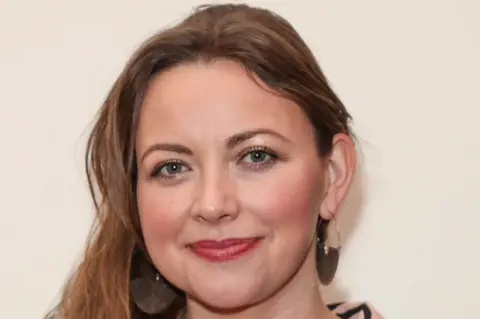The 19-strong roundtable of stars joining Claudia Winkleman at Ardross Castle in Scotland boasts household names across sport and the arts.
Among them are comedians Stephen Fry and Alan Carr, chat show host Jonathan Ross and Olympic diver Tom Daley – all vying to win the game of deception.
Singers Paloma Faith, Cat Burns and Charlotte Church will also be there, alongside others including historian David Olusoga, broadcaster Clare Balding, actress Celia Imrie and Ted Lasso star Nick Mohammed.
The third series of The Traitors, which aired in January, attracted more than 10 million viewers.
The show’s format is deceptively simple. A handful of contestants, known as traitors, pick off their castmates, the faithful, with nightly “murders” – while the faithful try to work out their identity. If any traitors remain at the end, they nab the cash prize (though this time the money goes to a charity of the winner’s choosing).
The celebrity season, which airs this autumn, will bring a unique mix of fame, ego and public image to the popular format. BBC News speaks to psychologists to uncover likely faithfuls, traitors and frontrunners.
The comedians
 Getty Images
Getty ImagesAlan Carr, Jonathan Ross, Stephen Fry, Joe Wilkinson and Lucy Beaumont
Comedians are likely to be “the obvious frontrunners to go the distance”, says Susie Masterson, a psychotherapist registered with the British Association for Counselling and Psychotherapy (BACP).
Humour can be a highly adapted defence mechanism, she says, which can make comedians more opaque than other contestants.
Comics are also quick on their feet, used to presenting a persona and masking in public – this makes them well-equipped traitors, notes Masterson.
“I think Alan Carr could well be a frontrunner,” she says. “There is an affability about him, but he’s also not afraid of stirring the pot. He’s very authentic and has a big personality without necessarily dominating the space.”
But fame could disadvantage the high-profile names in the group, like Jonathan Ross. Status, explains consultant counselling psychologist Dr Ritika Suk Birah, can create a power imbalance.
“It can make others feel threatened or suspicious of their motives, even when there’s no evidence,” she says.
This may be a particular challenge for those understood as both intelligent and articulate, like Stephen Fry.
This perception can lead others to assume strategic manipulation, potentially forcing early elimination out of fear rather than logic, adds Dr Birah.
Unfortunately, Masterson also believes Fry could fit into the category of contestants who “struggle with criticism or scrutiny”.
“He might struggle with banishing people as well as any potential heat he might receive,” she says.
The singers
 Getty Images
Getty ImagesPaloma Faith, Cat Burns and Charlotte Church
Stage performers like Cat Burns are used to high-pressure situations, interacting with a variety of people in a live environment. “This could help at the round table,” says Masterson.
She adds that Paloma Faith and Charlotte Church are both “big personalities and have direct communication styles”. While this may make them good motivators, Masterson is unsure whether they can appear contained or measured enough to endure as